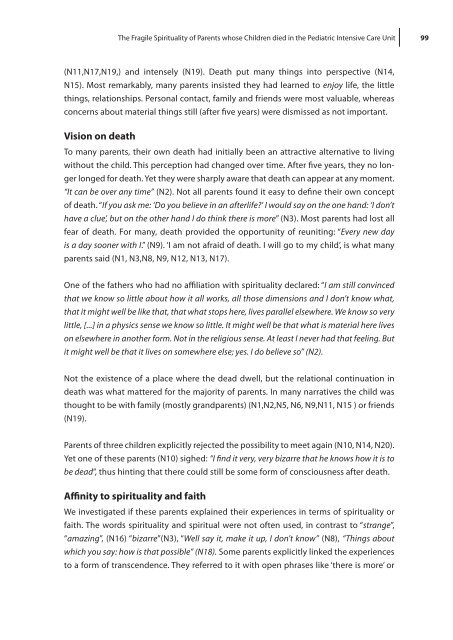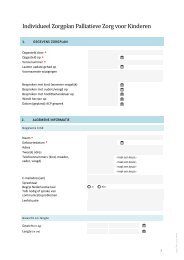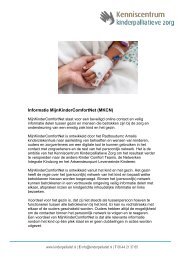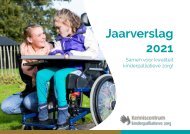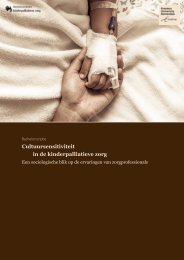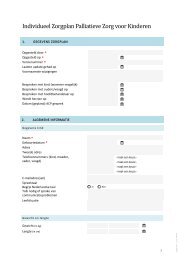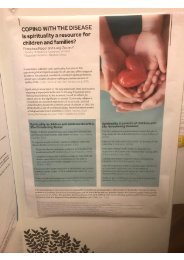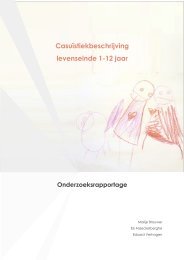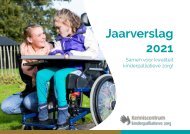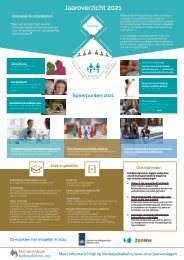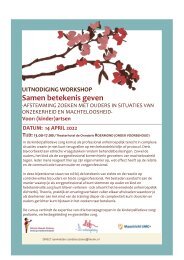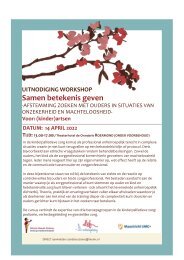Unveiling a fragile spirituality: Experiences of connectedness in pediatric palliative care
Create successful ePaper yourself
Turn your PDF publications into a flip-book with our unique Google optimized e-Paper software.
The Fragile Spirituality <strong>of</strong> Parents whose Children died <strong>in</strong> the Pediatric Intensive Care Unit 99<br />
(N11,N17,N19,) and <strong>in</strong>tensely (N19). Death put many th<strong>in</strong>gs <strong>in</strong>to perspective (N14,<br />
N15). Most remarkably, many parents <strong>in</strong>sisted they had learned to enjoy life, the little<br />
th<strong>in</strong>gs, relationships. Personal contact, family and friends were most valuable, whereas<br />
concerns about material th<strong>in</strong>gs still (after five years) were dismissed as not important.<br />
Vision on death<br />
To many parents, their own death had <strong>in</strong>itially been an attractive alternative to liv<strong>in</strong>g<br />
without the child. This perception had changed over time. After five years, they no longer<br />
longed for death. Yet they were sharply aware that death can appear at any moment.<br />
“It can be over any time” (N2). Not all parents found it easy to def<strong>in</strong>e their own concept<br />
<strong>of</strong> death. “If you ask me: ‘Do you believe <strong>in</strong> an afterlife?’ I would say on the one hand: ‘I don’t<br />
have a clue’, but on the other hand I do th<strong>in</strong>k there is more” (N3). Most parents had lost all<br />
fear <strong>of</strong> death. For many, death provided the opportunity <strong>of</strong> reunit<strong>in</strong>g: “Every new day<br />
is a day sooner with I.” (N9). ‘I am not afraid <strong>of</strong> death. I will go to my child’, is what many<br />
parents said (N1, N3,N8, N9, N12, N13, N17).<br />
One <strong>of</strong> the fathers who had no affiliation with <strong>spirituality</strong> declared: “I am still conv<strong>in</strong>ced<br />
that we know so little about how it all works, all those dimensions and I don’t know what,<br />
that it might well be like that, that what stops here, lives parallel elsewhere. We know so very<br />
little, [...] <strong>in</strong> a physics sense we know so little. It might well be that what is material here lives<br />
on elsewhere <strong>in</strong> another form. Not <strong>in</strong> the religious sense. At least I never had that feel<strong>in</strong>g. But<br />
it might well be that it lives on somewhere else; yes. I do believe so” (N2).<br />
Not the existence <strong>of</strong> a place where the dead dwell, but the relational cont<strong>in</strong>uation <strong>in</strong><br />
death was what mattered for the majority <strong>of</strong> parents. In many narratives the child was<br />
thought to be with family (mostly grandparents) (N1,N2,N5, N6, N9,N11, N15 ) or friends<br />
(N19).<br />
Parents <strong>of</strong> three children explicitly rejected the possibility to meet aga<strong>in</strong> (N10, N14, N20).<br />
Yet one <strong>of</strong> these parents (N10) sighed: “I f<strong>in</strong>d it very, very bizarre that he knows how it is to<br />
be dead”, thus h<strong>in</strong>t<strong>in</strong>g that there could still be some form <strong>of</strong> consciousness after death.<br />
Aff<strong>in</strong>ity to <strong>spirituality</strong> and faith<br />
We <strong>in</strong>vestigated if these parents expla<strong>in</strong>ed their experiences <strong>in</strong> terms <strong>of</strong> <strong>spirituality</strong> or<br />
faith. The words <strong>spirituality</strong> and spiritual were not <strong>of</strong>ten used, <strong>in</strong> contrast to “strange”,<br />
“amaz<strong>in</strong>g”, (N16) “bizarre”(N3), “Well say it, make it up, I don’t know” (N8), “Th<strong>in</strong>gs about<br />
which you say: how is that possible” (N18). Some parents explicitly l<strong>in</strong>ked the experiences<br />
to a form <strong>of</strong> transcendence. They referred to it with open phrases like ‘there is more’ or


